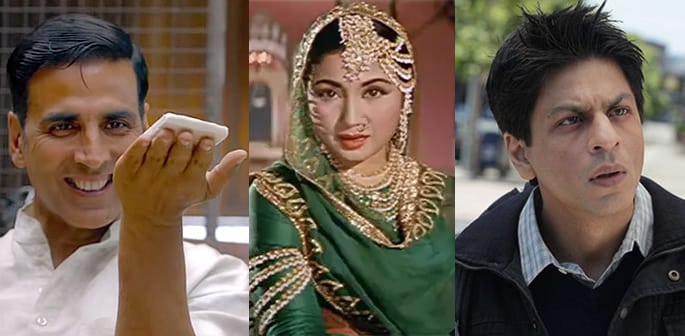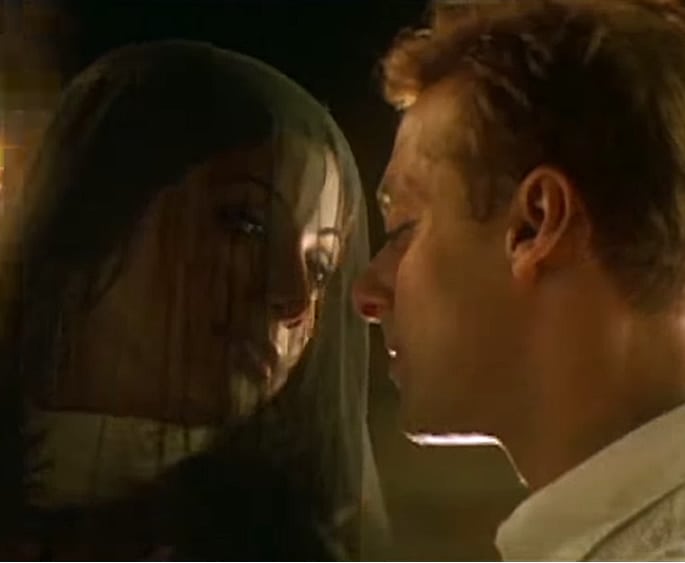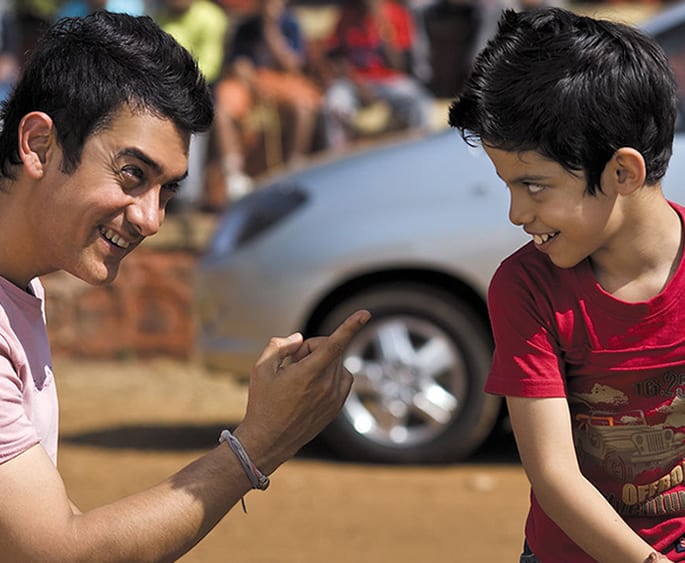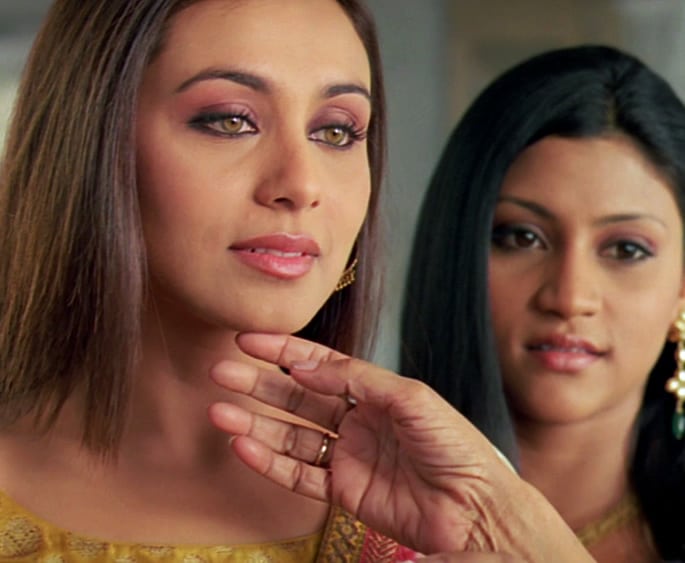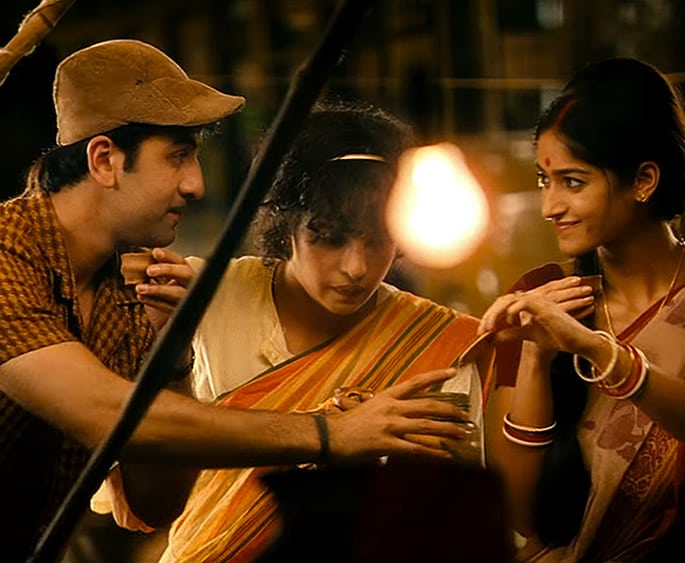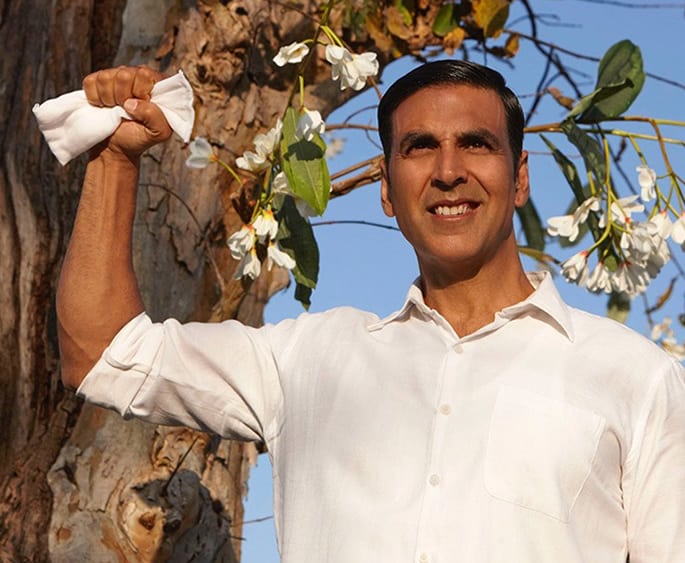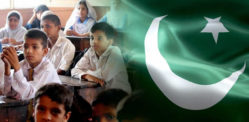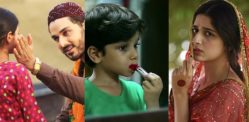The film was especially noted for braving Indian misconceptions of disabilities
Social stigmas like sex, mental health, drugs and alcohol are just a few of the issues that fall under the umbrella category of ‘taboo’ for many from the South Asian community.
Such topics are infrequently spoken of, or often avoided completely in South Asian culture.
Over the years, Bollywood has been shouldering the heavy burden of scrutinising social stigmas and normalising contentious topics.
Taking on some of the controversial areas of Desi life seldom openly talked about is always a challenge.
We count down some of the best Bollywood movies that dare navigate through the territory of taboos which require much-needed awareness.
Mother India (1957)
The oldest film on the list, and possibly one of the most stunning features of all time.
Mother India stars superstar Nargis – portraying the role of poverty-stricken, Radha, who is forced to raise her sons alone, whilst struggling financially.
After her husband Shamu (Raaj Kumar) leaves her, she finds herself in harsh circumstances – in a time where the concept of a single mother was unfathomable.
Radha became the textbook example of the ‘ideal’ woman, braving all the obstacles that came her way.
Mother India was India’s first submission in the Academy Award for Best Foreign Language Film in 1958. It also won the All India Certificate of Merit for Best Feature Film and the Filmfare Best Film Award for 1957. To this day, it still ranks among all-time Indian box office hits.
Described as a “flag-bearer of Hindi cinema and a legend in its own right,” Mehboob Khan’s Mother India, a remake of his older film, Aurat (1940) is a must-see.
Pakeezah (1972)
An Indian cult classic film, Pakeezah is a movie ahead of its time, addressing social taboos which remain to this day.
The tale of forbidden love strikes a chord with thousands, as Nargis (Meena Kumari) a courtesan and dancer, longs to be accepted by society’s prying eyes.
She falls for Shahabuddin (Ashok Kumar) who she endeavours to marry but is forbidden from doing so at the behest of his conservative family.
The story continues where Nargis shunned by Shahabuddin’s family gives birth to a daughter, Sahibjaan (also played by Meena Kumari). She lets Shahabuddin know in a letter on her deathbed.
However, Sahibjaan, as an adult, is taken away by her aunt Nawabjaan on a train. This is where she meets a dashing stranger who admires her feet, saying:
“Aapke paon dekhe, bahut haseen hain. Inhein zameen par mat utariyega… maile ho jaayenge”
Translated, “I saw your feet – they are very beautiful. Please don’t step on the ground, as they will get dirty.”
This story evolves to Sahibjaan becoming a courtesan too.
She crosses paths with the stranger later, Salim Ahmed Khan (Raaj Kumar), who wants to legally marry her after calling her “Pakeezah” (Pure of Heart).
She refuses and returns to the brothel as not being worthy.
Salim marries another and requests Sahibjaan to perform at his wedding. She does, and this is where her father, Shahabuddin, is told by Nawabjaan (her aunt) that the girl dancing is his own daughter.
The tale highlights the stigma faced by courtesans and prostitutes in India.
A classic, this simply cannot be missed.
Roti Kapda Aur Makan (1974)
This Filmfare winning film, produced, directed, written and starring Manoj Kumar highlights the struggles of a typical poor family in India and cultural expectations on the men in the household.
Bharat (Manoj Kumar) is responsible for looking after his family after his father retires. He is responsible for his siblings. His younger brothers Vijay (Bachchan), Deepak (Dheeraj Kumar) and Champa (Meena T) his sister who is of a marriage age.
Despite being educated Bharat struggles to find work not impressing the patience of his girlfriend Sheetal (Zeenat Aman).
To provide for the family Vijay turns to crime but then leaves to join the army after arguing with Bharat.
When Sheetal starts working for Mohan Babu (Shashi Kapoor) a rich businessman, he attracts her with his wealth. Eventually, leaving Bharat to marry Moan because Bharat only offers a life of poverty.
Bharat loses his love and then loses his father. He can’t even afford to pay for Champa’s wedding which then does not go ahead. He cannot provide the basics Roti (food), Kapada (Clothing), and Makaan (Shelter).
When a corrupt businessman Nekiram (Madan Puri) persuades Bharat to do illegal jobs to help him and his family come out of poverty, Bharat is left with a dilemma.
The film then centres around the social stigma if Bharat agrees to do join the life of crime or stick to his morals.
Prem Rog (1982)
Listed by Cosmopolitan magazine as one of its top ten ‘Most Romantic Films Ever,’ Prem Rog enshrines a strong social message amidst an idyllic love story.
Starring Bollywood luminaries Rishi Kapoor and Padmini Kolhapure, the film sees Devdhar – hopelessly in love with his dear friend, Manorama.
Due to clashes of social status, he refrains from sharing his sentiments and watches wistfully as she marries a man of her family’s choice.
Thakur unexpectedly passes a day after his wedding, leaving behind a grieving Manorama.
Alone and vulnerable, she is raped by her brother in law, and too afraid to speak up. After Devdhar learns about Manorama’s situation, he vows to redress her now turbulent life.
One of the most tragic love stories of Bollywood, Prem Rog is definitely one to keep an eye out for.
Damini (1993)
One of few Bollywood movies to deliver a strong female lead to Indian audiences, Damini is a moving drama starring veteran actors, Meenakshi Seshadri, Rishi Kapoor and Sunny Deol.
When Damini (Meenakshi Seshadri) marries her love, Shekhar (Rishi Kapoor) life takes an unsuspecting turn.
After witnessing her lover’s younger brother raping their maid, she reports it immediately to Shekhar, only for her to be silenced as his family conspire to hide his shameful deeds.
The path to justice is a long and tiresome one, as her lawyer, Govind (Sunny Deol) fights relentlessly for integrity and truth.
A heavy film which may be difficult for some to digest, Damini is an unmissable social drama.
Kya Kehna (2000)
Ahead of its time, Kya Kehna became one of the highest-grossing Bollywood films of 2000, despite its taboo nature.
Though the film starts out as a family-friendly feature, the viewer is struck with the unspoken issue of pre-marital pregnancy.
After falling in love with college playboy, Rahul (Saif Ali Khan) Priya (Preity Zinta) develops a relationship and loses her virginity to him. Eventually, Rahul leaves her, mocking her romanticised ideals of love.
Left heartbroken, she learns to live her life without him. Much to her parents’ dismay, she learns she is pregnant with Rahul’s baby.
Her parents arrive at Rahul’s house immediately, begging that he marries their pregnant daughter and saves them from society’s judgments. He refuses, and Priya is now left with the life-changing decision of whether or not she wishes to keep her child.
Her motherly instincts kick in early, leading her to keep the baby. On this note, Priya’s father banishes her from the family home.
Throughout the film, Priya is forced to brave the face of her snobbish community, who ostracise her for being pregnant while still being unmarried. She challenges their ‘holier than thou’ stance and defies their double standards on pre-marital sex for men and women.
Though cringe-worthy and overly cheesy at some points, Kya Kehna is a well-executed comedy-drama, which confronts India’s stigma of pre-marital sex and pregnancy.
Phir Milenge (2004)
The emotional drama covers the delicate issue of AIDS, a taboo across all cultures.
The film stars Shilpa Shetty as our lead – assuming the role of Tammana – the head of a top advertising company in India.
She has it all – friends, family and career – but her blissful reality has an expiry date.
Her seemingly perfect life is brought to a standstill on discovering that she is HIV positive.
There on she faces discrimination from all those around her, including her boss – who dismisses her after deeming her inadequate in the workplace.
Frustrated by her unjust dismissal, she hires a lawyer to help fight her case. Tarun Anand (Abhishekh Bachchan) eventually agrees to represent her in court.
The movie follows Tammana’s fight for justice in a merciless society, challenging the numerous ugly misconceptions surrounding AIDS in the modern world.
With the general adult themes embodied in the film, Phir Milenge is one for more mature audiences to reflect on.
Black (2005)
Another one of Sanjay Leela Bhansali’s fine works, Black is a drama starring Rani Mukherjee and veteran actor Amitabh Bachchan.
The poignant narrative was a success domestically and internationally. It became the second highest grossing Indian film worldwide in 2005 and the highest grossing 2005 Bollywood film overseas.
After losing her eyesight and hearing when recovering from an illness at two years of age, Michelle (Rani Mukherjee) is confined to an isolated world – trapped by her inability to see, hear and speak clearly.
Her parents, burdened and frustrated with their daughter’s disability, seek help elsewhere. Enter Debraj (Amitabh Bachchan) – an elderly teacher for the deaf and blind – who shoulders the responsibility of illuminating her life once again.
The story follows Michelle and Debraj’s unlikely friendship and their tireless struggles as they clash with the world.
A graceful tale and fascinating outlook on disabilities, the gripping saga looks adversity in the eye and combats misconceptions reverently.
Rang De Basanti (2006)
This Indian political drama thrived, being declared a ‘Blockbuster’ by Box Office India. It also transversed borders, being entered for the Golden Globe Awards and the Academy Awards under the Best Foreign Language Film category.
We are met with an array of actors, including Aamir Khan, Siddharth Narayan, Soha Ali Khan, Kunal Kapoor, R. Madhavan, Sharman Joshi, Atul Kulkarni and British actress Alice Patten.
The film blends themes of love, history and friendship as we follow Sue (Alice Patten) a British documentary film-maker, as she visits India in an attempt to recreate the intimate stories of Indian freedom fighters, as recorded in her grandfather’s diary entries.
A heavy film with a tender cast and alluring soundtrack, Rang De Basanti should be watched with a box of tissues nearby.
Taare Zameen Par (2007)
Starring, directed and produced by none other than Aamir Khan, viewers should expect nothing less than incredible from the thought-provoking production.
A social drama revolving around Ishaan, a dyslexic eight-year-old who is misunderstood by those around him – all except for his art teacher – Ram Shankar Nikumbh (played by Aamir Khan).
Ishaan’s strict father in the poignant feature was an accurate portrayal of many critical Indian parents, claiming their child is ‘stupid’ for being unable to achieve high grades in school, and rendering his passion for art ‘useless’ in the real world.
With Nikumbh’s enthusiasm and unwavering dedication, Ishaan finally learns to read and write.
The film was especially noted for braving Indian misconceptions of disabilities. A real tear-jerker, but an unmissable family movie.
Lagaa Chunari Mein Daag (2007)
Despite its low budget and negative reviews from critics, the audacious feature made its mark with audiences worldwide.
The controversial drama follows the lovable, naive Badki, a village girl who would sacrifice anything for her family. After her father falls ill, she moves to Mumbai in an attempt to support her struggling parents and pay for her younger sister’s schooling.
Due to Badki’s lack of education, the prospects of her finding an office job become virtually impossible. With familial pressures looming, she finds herself out of options and takes up a job as a prostitute, keeping the matter hidden from her family.
Viewers are then taken on a journey, showing Badki’s new life and transformation from a once childlike woman to a ‘lady of the night.’
What many have admired about the film is the distinctive narrative it takes. The piece depicts life’s many shades, challenging the ‘black and white’ world we supposedly live in.
An outstanding feature which encourages audiences to empathise with those on a different path, Lagaa Chunari Mein Daag is a must see.
3 Idiots (2009)
Boasting countless awards, 3 Idiots is a comedy-drama film that dissects the education system in India.
The movie did especially well with East Asian audiences, particularly in China and Japan, bringing its global gross to approximately $90 million, making it the highest grossing Bollywood film of its time.
A remake was done in Tamil, Nanban (2012). Mexican cinema also made their own version, 3 Idiotas in 2017.
The viewer joins the tumultuous journey of Rancho, (Aamir Khan) Farhan (R. Madhavan) and Raju (Sharman Joshi), three college friends who have conflicting views on their life goals.
The 2 hour 51-minute feature sets off a whirlwind of emotions – delving into friendship, love and India’s flawed education system.
Be prepared to cry – of laughter and of sorrow.
Guzaarish (2010)
Already a tricky topic to discuss in the western world, euthanasia is barely heard of in India.
Sanjay Leela Bhansali’s Guzaarish is the only Bollywood movie to have dabbled in the issue of assisted suicide.
The 2010 hit follows Ethan Mascarenhas (Hrithik Roshan) a former magician who was immobilised with a spinal injury for fourteen years, being cared for by his nurse, Sofia D’Souza. (Aishwarya Rai)
He appeals to the court for a mercy killing on the 14th anniversary of his accident, with his best friend and lawyer, Devyani, supporting his appeal.
From here on, the spectator warms to Ethan’s story – regardless of their views on mercy killings. A refreshing narrative, Guzaarish is not one to miss.
My Name Is Khan (2010)
My Name is Khan stars Bollywood’s much-loved duo, Shah Rukh Khan and Kajol.
The Baadshah of Bollywood adopts the role of Rizwan Khan, an autistic, middle-class male living with his mother in Mumbai.
After his mother’s passing, Rizwan moves over to America to live with his brother, Zakir. There he meets Mandira (Kajol) from which point forward we witness the heart-warming love story between the two.
All is going well for them – until September 11, 2001. From this point forward, Rizwan and Mandira’s relationship takes a drastic turn.
Not only does the narrative fixate on the anti-Muslim sentiments in America and the harsh realities of living as a Muslim post 9/11, but it also takes on the misconceptions surrounding mental health.
A compelling storyline, My Name Is Khan is definitely one to watch – but make sure you stock up on those tissues.
Vicky Donor (2012)
This Rom-Com was produced by actor John Abraham and was inspired by the Canadian feature, Starbuck. (2011)
As the title suggests, Vicky Donor is about a young man, Vicky (Ayushmann Khurrana) who becomes a sperm donor.
Sick of his inadequate lifestyle, Vicky opts to become a sperm donor. This is an attempt at contributing financially to his household and offering a helping hand to his widowed mother.
Due to the stigma surrounding sperm donation, Vicky keeps the matter guarded, even after he marries.
What transpires after perfectly captures the misconceptions and stereotypes surrounding sperm donation. The film even won the National Film Award for Best Popular Film Providing Wholesome Entertainment at the 60th National Film Awards.
Make sure you watch it – just not with the family!
Barfi (2012)
This film is a coy but powerful story about love amongst the abnormal, specifically, the disabled.
Barfi played by Ranbir Kapoor is a guy who is deaf and has a speech impairment, Jhimil (Priyanka Chopra) is an autistic girl abandoned by her rich parents and Shruti (Illeana De Cruz) is the soon to be married tourist visiting Darjeeling, is the one who narrates the love story.
The deeper layers in the film highlight why India is not comfortable with disability.
How people are very scared of social approbation, such that they are willing to abandon children who are not normal.
So the plot between the three characters shows how happiness can be found in the little things in life and how financial, mental, or physical disabilities cannot hinder the soaring spirit within a person who does not give up on love.
Love is portrayed as a natural decision of the heart, not the mind or body.
What makes this film one to watch is that it has an unending list of incredible scenes which make you laugh, cry and sometimes do both simultaneously.
Toilet (2017)
This social message comedy-drama stars Bollywood’s action hero, Akshay Kumar, taking on the role of the protagonist, Keshav.
Loosely based on the Tamil hit, Joker (2016), Toilet confronts the issue of poor sanitation conditions in rural India in an unconventional way.
A problem which is still existing today, especially amongst the poor. There are millions of homes in India without a toilet.
The film was a commercial success, becoming Akshay Kumar’s highest grossing film of all time.
A quirky feature, Toilet is one to be watched with an open mind.
Padman (2018)
Inspired by Tamil Nadu based social activist, Arunachalam Muruganantham, who created an affordable sanitary napkin machine in rural India.
The film follows Lakshmikant Chauhan (Akshay Kumar) and Gayatri (Radhika Apte) a happily married couple living in a small village in India.
After Lakshmikant notes the difficulties his wife faces in order to get sanitary protection, he decides to seek a less costly alternative to sanitary pads.
In a society where women are shunned throughout their menstruation periods, the film follows Lakshmikant’s attempts to eradicate stigmas, whilst also facing a backlash from his judgmental community.
Daring to confront an uncomfortable subject area, Padman is a must see movie for all.
Bollywood is certainly more open than ever before to address films which highlight social stigmas.
We can expect more films of this nature in the future.
So, there we have it – some of the top Bollywood movies that confronted social and cultural stigmas. Be sure to check them out!



















































